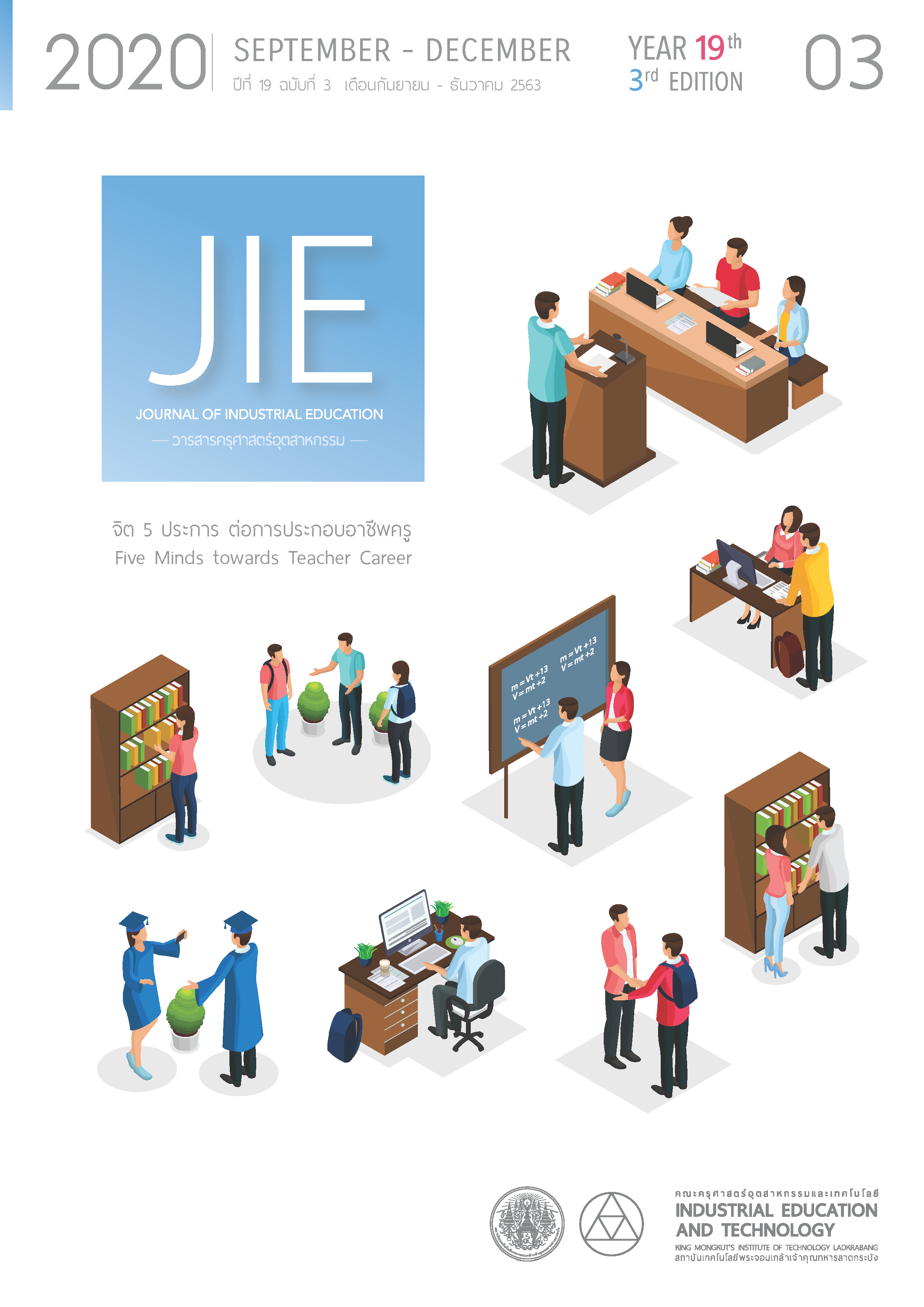DEVELOPMENT OF INNOVATIVE THINKING ACTIVITY PACKAGES TO PROMOTE SCIENCE PROJECT PERFORMING AND TEAMWORK ABILITIES OF SEVENTH GRADE STUDENTS
Keywords:
Science project activity packages, Innovative thinking, Unguided science project performing, Teamwork abilities, Science project outline writing abilitiesAbstract
The purposes of this research were: 1) to create innovative thinking activity packages 2) to study the effect of the innovative thinking activity packages to promote science project performing and teamwork abilities. The research design was one-group repeated measured design. The sample consisted of thirty-two seventh grade students who enrolled in the pre-science project in the second semester of the academic year 2019 at a large secondary school in Bangkok. The sample in this study was selected by cluster random sampling. The instruments used in this research included: 1) the lesson plan of innovative thinking activity packages; 2) the innovative thinking activity packages; 3) the evaluation forms of science project performing; 4) the test of ability to write science project outline; and 5) the evaluation forms of teamwork abilities. The hypotheses were tested by t-test for one sample and one-way ANOVA repeated measures.
The results of this research were as follows: students who learned with the innovative thinking activity packages had science project performing while studying increased at a .01 level of statistically significant and to do unguided science project performing higher than the criteria (60%) at a .01 level of statistically significant. In addition, students who learned innovative thinking activity packages had teamwork ability increased at a .01 level of statistically significant.
References
Office of the National Economic and Social Development Council. (2017). The Twelfth National Economic and Social Development Plan (2017-2021). [online]. Available https://www.nesdc.go.th/ewt_dl_link.php?nid=6422 Retrieved May 28, 2017. (in Thai)
Panich, V. (2014). Development of Learning in the 21st Century. Bangkok : The Siam commercial Foundation. 12. (in Thai)
Office of the Education Council. (2014). Research Report, Guidelines for Thai Educational Development and Readiness to the 21st Century. Bangkok : Office of the Education Council. 17-21. (in Thai)
Panich, V. (2012). Development of Learning for Student in 21st Century Way. Bangkok : Sodsri-Saridwongso Foundation. 28-36. (in Thai)
King Mongkut’s University of Technology Thonburi. (2012). Teacher Development Training Guide on Project-based Learning Management for the Science Base Technology School Project. Bangkok : King Mongkut’s University of Technology Thonburi. 34-35. (in Thai)
Juito, S. (2011). Management of New Innovations. 2 nd ed. Bangkok : Sukhothai Thammathirat Open University. 62-78. (in Thai)
Degennaro, A. K. (2012). “Young Investigators: The Project Approach in the Early Years.” Journal of Experiential Education. 35(1), 305-306.
Puranachoti, T. (1988). Teaching Science Project Activity: Handbook for Teachers. Bangkok : Chulalongkorn University Science Project Activity Teaching. 1. (in Thai)
Sirimahasakorn, B. (2002). Curriculum Design and Project-Based Learning Activities. Bangkok : Book point. 17. (in Thai)
Dejakup, P., & Yindeesuk, P. (2016). Teach Children to do Project Work Teach Teacher to do Action Research in the Classroom. Bangkok : Chulalongkorn University. 16. (in Thai)
Chotratanawong, K. B. (2001). Science Project for Primary Education Principle and Operation. Bangkok : Chulalongkorn University. 4-6. (in Thai)
Minwong, Y. (2015). “Development of a Science Project Instructional Model with the Emphasis on Creative Problem Solving (3P) of the Eighth Grade Students.” Dissertation, Ed.D (Science Education), Graduate School, Srinakharinwirot University. 4. (in Thai)
Arunrat, K. (1993). Educational Technology. Bangkok : King Mongkut's University of Technology North Bangkok. 193. (in Thai)
Sinthapanon, S. (2010). Innovative Teaching and Learning to Improve the Quality of Youth. 4 th ed. Bangkok : 9119 Techniques Printing. 14. (in Thai)
Limtasiri, O. (2008). Innovations and Teaching Technology. 4 th ed. Bangkok : Ramkhamhaeng University. 168. (in Thai)
Roongruang, C. (2014). “Effects of Using Activites Packages on the Topic of Science Project on Learning Achievement and Scientific Creative Thinking of Mathayom Suksa 1 Students of Expanded Opportunity Group School Phasicharoen District Office in Bangkok.” Electronic Journal of Open Distance Innovative Learning. 4(2), 75-87. (in Thai)
Ferrante-Schepis, M. (2016). Innovative thinking vs. innovation: key differences uncovered. [online]. Available https://www.thinkadvisor.com/2016/08/02/innovative-thinking-vs-innovation-key-differences-uncovered/ Retrieved June 15, 2017.
Haemaprasith, S. (2000). “Constructivism.” Encylopedia of Education. 21, 91-96. (in Thai)
Songkrut, N. (2018). “Effects of Project-Based and Research-Based Learning on the Ability in Doing Science Projects and Self-Esteem of the Tenth Grade Students.” Master’ thesis, M.Ed. (Educational Science and Learning Management), Graduate School, Srinakharinwirot University. 116-117. (in Thai)
Hoegl, M. (2005). “Smaller Teams-Better Teamwork: How to Keep Project Teams Small.” Business Horizons. 48(3), 209-214.
Williams, S. (2017). “Investigating The Allocation and Corroboration of Individual Grades for Project-Based Learning.” Studies in Educational Evaluation. 53, 1-9.
Downloads
Published
How to Cite
Issue
Section
License
"The opinions and contents including the words in papers are responsibility by the authors."
"ข้อคิดเห็น เนื้อหา รวมทั้งการใช้ภาษาในบทความถือเป็นความรับผิดชอบของผู้เขียน"



